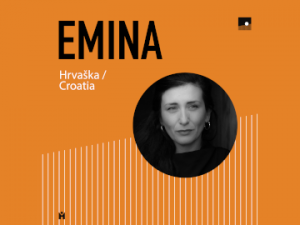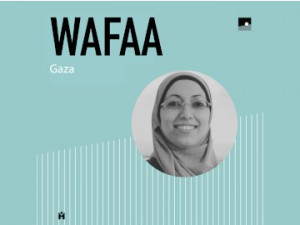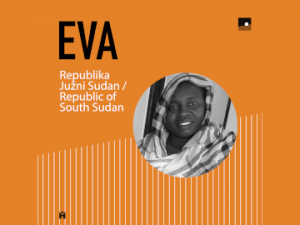Living Peace 5: Letters of Wars and Peace
22. 1. 2025 | Politics
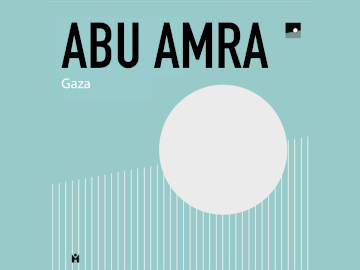
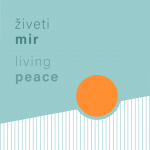 At the end of 2022, we at the Peace Institute, started organizing a series of public events entitled Thinking Peace as a response to the multitude of armed conflicts around the world. Since the world has been spiralling into dangerous global militarization, we wanted to rethink what is war, what is peace, and more importantly how to ensure a stable peace which would not be quickly engulfed in new conflicts and wars.
At the end of 2022, we at the Peace Institute, started organizing a series of public events entitled Thinking Peace as a response to the multitude of armed conflicts around the world. Since the world has been spiralling into dangerous global militarization, we wanted to rethink what is war, what is peace, and more importantly how to ensure a stable peace which would not be quickly engulfed in new conflicts and wars.
We want to expand on the Thinking Peace cycle and add new dimensions to imagining peace. With the help of amazing individuals worldwide, we are beginning a new series of public letters written by people whose lives were interrupted by war or who found themselves in a recent armed conflict. We have titled this series of letters as Living Peace to emphasize how important peace is and that people often only realize this importance when facing the brutality of war. We want to illustrate how people from Palestine, Ukraine, Rwanda, Bosnia and Herzegovina, Croatia, Serbia, Syria, Sudan, Afghanistan, Congo, Yemen and elsewhere think publicly about peace. How do the inhabitants of these regions face wars and military conflicts? What lessons can we learn from their intimate experiences and existential fears?
While opinions of world leaders who justify or even defend wars, dominate today’s media spheres, we want to amplify the voices that defend peace, reject violence and recognize equal rights for all. Having experienced war, they understand why it is essential to live in peace.
The fifth letter we are publishing was written by Abu Amra from Gaza:
The importance of living with dignity and peace is a fundamental value upheld by all religions and laws. But sadly, so many people today are subjected to exclusion and suffering due to political conflicts.
Perhaps this experience prompts us to consider how the international community can help achieve peace and find sustainable solutions that restore hope to these individuals and their families, as peace is a right deserved for every one of us.
What if we could all live in peace?
This is an important question that requires collective answers and true political that will bring about much needed change.
*The letter was written in November 2024, before the ceasefire agreement.
LETTER BY ABU AMRA FROM GAZA:
All heavenly religions and laws around the world enshrine the right to a dignified life and the fulfillment of human needs in their codified texts.
***
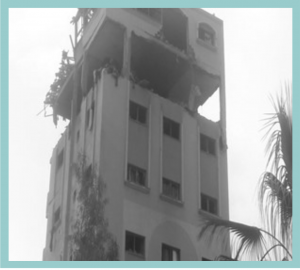 Gaza in the Middle East is a region torn by war and plagued by extreme poverty, living under an illegal and stringent Israeli blockade on land, air, and sea. The blockade, alongside armed violence and recurrent conflict, remains the primary cause of the socio-economic and psychological crisis in Gaza. The restrictions on the movement of people and goods impose collective punishment on the civilian population, affecting all aspects of life and undermining the local economy while threatening the enjoyment of many human rights.
Gaza in the Middle East is a region torn by war and plagued by extreme poverty, living under an illegal and stringent Israeli blockade on land, air, and sea. The blockade, alongside armed violence and recurrent conflict, remains the primary cause of the socio-economic and psychological crisis in Gaza. The restrictions on the movement of people and goods impose collective punishment on the civilian population, affecting all aspects of life and undermining the local economy while threatening the enjoyment of many human rights.
This is the story’s beginning—a story of a people born from the depths of war, suffering, injustice, and tyranny. Their rights, recognized by all heavenly religions, include the right to live in peace and security.
R.B.A. is a young man from Al-Nuseirat camp in Gaza. He lives there with his family, his father and several siblings. This young man enjoyed a comfortable life during his studies, as the family’s priority was to receive his education before starting work. However, during summer breaks, he worked on farms collecting vegetables and fruits to help his father pay for university tuition and study supplies. Eventually, R.B.A. finished his studies and was able to look for a job in his field of study, but luck was not on his side. After much effort, he found a job at an internet company for a meager salary, which he accepted out of necessity and the desire to build a future.
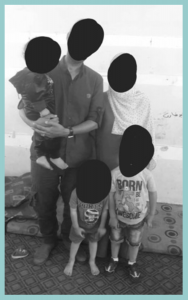 After a few months of work, armed conflict erupted, and the situation in Gaza worsened. This young man did not want to join armed groups or engage in the limitless politics, seeking instead a safe and peaceful life, but circumstances did not allow him to enjoy that peace.
After a few months of work, armed conflict erupted, and the situation in Gaza worsened. This young man did not want to join armed groups or engage in the limitless politics, seeking instead a safe and peaceful life, but circumstances did not allow him to enjoy that peace.
The company fired those employees who were not supporters of the current regime, many other young men and women working in various fields in other companies. Once again, R.B.A. found himself searching for work, but despair and loss of hope crept into his life. He reverted to searching for jobs in stores and agricultural fields, but the blockade and strict closures made it difficult for him to find work. He worked sporadic jobs to earn some money for his survival.
As time passed and years went by, he grew older and needed to marry due to social customs and traditions. With the support of his family and due to his financial limitations, he found a way to marry into a poor family that did not require large sums of money for a marriage contract. First it was him and his wife. After a year, they welcomed their first child, followed by the second and the third one, but the conditions continued to worsen due to the tightening blockade and declining incomes across the (agricultural) sector. Those who owned any property preferred family members to work there.
Life became increasingly difficult despite R.B.A.’s and his wife’s attempts to find jobs to improve their situation and that of their children, but to no avail. Then came the great tragedy — the war on Gaza, which robbed them of peace and modest living they had managed to build, transforming their life into a hard one. They began to move from place to place in search of safety for their children, who were still at an age where they only knew children’s play, without oppression, hunger, and deprivation. The entire family struggled with exhaustion and the bitterness of days, hoping for the war to end so that they would be able to return to the warm embrace of their small home.
Unfortunately, each day passed before their eyes, scenes of bombing, destruction, bloodshed, and martyrs, stripped them of any passion and hope of peace, a return home made impossible after their house had been completely destroyed. They found themselves in shelters, in shared rooms with other families, without basic means to live, without a shield to cover their frail bodies in the harsh winter cold.
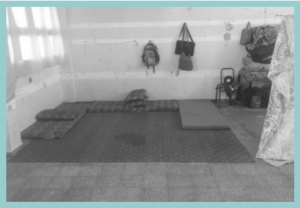 Living under these pressures and hardships, R.BA.’s wife began to suffer from severe depression, her psychological state worsened, developing nerve issues with spasms brought on by fear and panic she experienced, when entire population endured bombardment and destruction from the Israeli authorities targeting citizens’ homes and properties. She was now unable to bear the responsibility of caring for her family, forcing the young man to shoulder all the burdens of life amid these difficult conditions: power outages, water shortages, and long waits to obtain food aid, in addition to caring for his children and a wife unable any longer to move.
Living under these pressures and hardships, R.BA.’s wife began to suffer from severe depression, her psychological state worsened, developing nerve issues with spasms brought on by fear and panic she experienced, when entire population endured bombardment and destruction from the Israeli authorities targeting citizens’ homes and properties. She was now unable to bear the responsibility of caring for her family, forcing the young man to shoulder all the burdens of life amid these difficult conditions: power outages, water shortages, and long waits to obtain food aid, in addition to caring for his children and a wife unable any longer to move.
He had to travel long distances to fetch water on his shoulders, leading to a spinal disc injury and severe pain, compounded by the lack of medical care in health centers and hospitals due to the overwhelming number of injured people and a shortage of medicines.
I cannot describe my feelings in the face of these terrifying, destructive, and life-taking events that affect innocent lives.
* * *
This is a glimpse into the life of a refugee sheltered in temporary shelters.
This story reflects the depth of human suffering amidst wars and the difficult circumstances faced by Gaza’s residents. It illustrates the experience of R.B.A., mirroring the reality of many young people striving to achieve their dreams yearning to live in peace and security while living in an environment plagued by human suffering and military atrocities.
The importance of living with dignity and peace is a fundamental value upheld by all religions and laws. But sadly, so many people today are subjected to exclusion and suffering due to political conflicts.
Perhaps this experience prompts us to consider how the international community can help achieve peace and find sustainable solutions that restore hope to these individuals and their families, as peace is a right deserved for every one of us.
What if we could all live in peace?
This is an important question that requires collective answers and true political that will bring about much needed change.
Abu Amra
*The letter was written in November 2024, before the ceasefire agreement.


